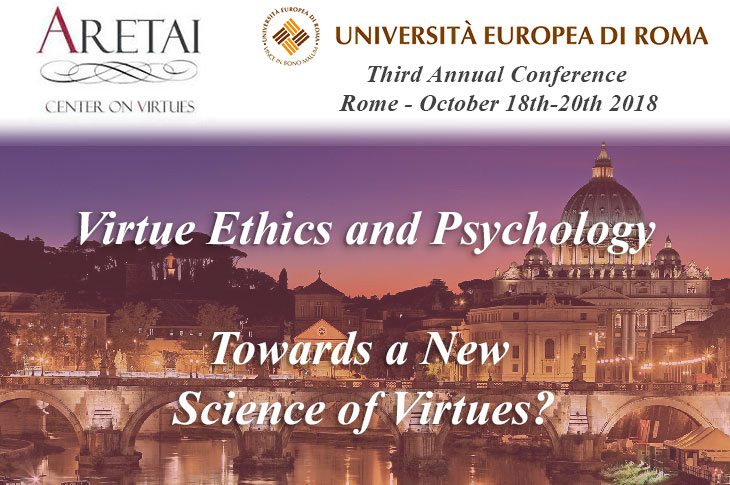Conference: Virtue Ethics and Psychology – Towards a New Science of Virtues?

The main purpose of the conference is to investigate the link between virtue theory and current psychological research. The conference aims at inquiring into the connections between virtue ethics and different branches of psychology from a methodological, conceptual and applied perspective, with special focus on educational implications.
We aim at gathering scholars interested in the virtues from both a philosophical and an interdisciplinary approach, who can contribute to the advancement of a plausible, empirically-informed virtue-ethical program.
Invited speakers
- Mario De Caro (University of Roma Tre – Tufts University)
- Antonella Delle Fave (University of Milan)
- Christian B. Miller (Wake Forest University)
- Darcia Narvaez (University of Notre Dame)
- Jonathan Webber (University of Cardiff).
- Maria Silvia Vaccarezza (University of Genoa)
Scientific Committee
- Claudia Navarini (European University of Rome)
- Angelo Campodonico (University of Genoa)
- Kristjan Kristjánsson (Jubilee Center, Birmingham)
- Natasza Szutta (University of Gdansk)
- Marco Innamorati (European University of Rome)
- Anna Contardi (European University of Rome)
Organizing Committee
- Rebecca Honorati
- Massimo Continisio
- Antonella Bruno
- Damiano Simoncelli
Sections & key questions
With the aim of including as many contributions as possible, the conference will be structured around plenary sessions with lectures given by the invited speakers, and parallel sessions with the contributed papers selected by double blind review.
Methodology
- How should we conceive of the relationship between the normative dimension of virtue ethics and the descriptive one of psychology?
- How can research in one field affect the other? Which cases best exemplify such possible fruitful interaction?
- Can positive and social psychology be powerful resources for inquiring into the nature of virtue? Which other branches of psychology are suitably equipped in this respect?
- Is the very idea of virtue as a character trait empirically plausible? If so, which account of virtue best fits psychological evidence on human behavior?
- Does psychological research confirm the virtue-ethical idea of the primacy of virtues over general norms?
Addressing the situationist challenge
- How much of our thinking, feeling, and acting is predicted by situational factors?
- Does the impact of studies concerning situational factors speak against the notion of virtues as character traits?
- Should we conceive of the virtues as global or local traits?
- Should we account for a distinction between high-fidelity virtues, which require a high degree of consistency, and low-fidelity virtues, which admit of a lower degree of consistency? (see Alfano 2013: 241; Doris 2010, 139n5).
- Is the thesis of the unity or reciprocity of the virtues defensible, in light of situationism and of other psychological criticisms? How should we reformulate this thesis in order to defend it from such criticisms? (see, e.g., Gulliford&Roberts 2018).
- How should we adequately account for the so-called “surprising dispositions”? Is Miller’s account of “mixed trait” a convincing one?
Educational applications
Which account of virtue acquisition best accommodates psychological evidence on the matter?
Should we stick to the virtue-as-skill paradigm, grounded on the idea of habituation, or should we buy into different accounts?
For further information, visit the official website
Download the event program (PDF)
